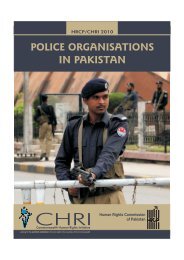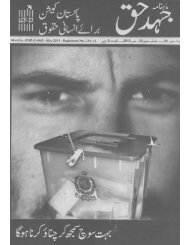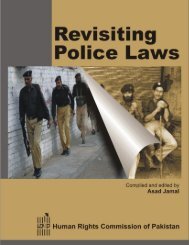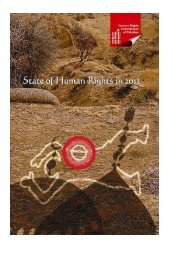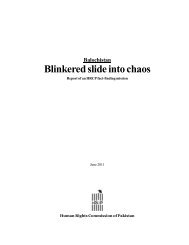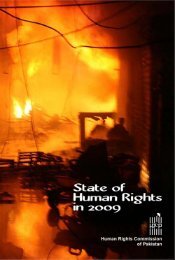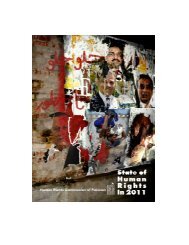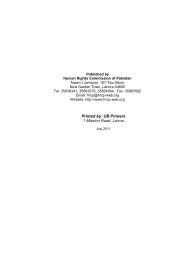Download PDF file - HRCP
Download PDF file - HRCP
Download PDF file - HRCP
You also want an ePaper? Increase the reach of your titles
YUMPU automatically turns print PDFs into web optimized ePapers that Google loves.
<strong>HRCP</strong> fact-finding missions’ report 67<br />
(chowkidar) he requested the DCO and the DPO for security whereupon the latter shifted the record to the police<br />
station. This arrangement created problems for him and the public in accessing the record. Further, he said, the<br />
patwari was not allowed any TA/DA for land survey / measurement and the expenses on his travel, etc., had to be<br />
borne by the applicant (who wanted the land to be measured). The office was not allowed any stationery fund. Thus,<br />
those seeking help from the officials had to pay for stationery also. Besides, the government stopped making payments<br />
(at Rs 1,000 per month) to the person who accompanied the patwari and actually measured land, and his wages too<br />
had to be paid by the applicant. The land record was not open to public. Permission had to be sought from the<br />
settlement officer who had his office in Turbat.<br />
One of the factors contributing to confusion in regard to land titles, the Naib Tehsildar said, was that some<br />
Gwadar citizens had dual nationality (Pakistan and Oman) and sometimes Omani documents were produced to claim<br />
ownership of land.<br />
All disputed matters had to be referred to the EDO (R). The higher forums were the Senior Member of the Board<br />
of Revenue and the Qazi court. However, during his 18 months’ tenure no complaint regarding title deeds had been<br />
submitted to him.<br />
A person, Ramzan Hasan met the team on October 21 and told this story. The settlement office entered 200<br />
acres of his land in the name of a landlord, Seth Rajab Shehnoori. However, the latter gave him in writing that the land<br />
belonged to him (Ramzan Hasan). When he approached the settlement office for entering his name as the landowner,<br />
he was told no mutation was possible in view of the ban on sale of land. When he pointed out that his request did not<br />
involve sale or purchase of land, he was told to wait. Subsequently, Seth Rajab Shehnoori wanted to buy his land and<br />
he refused. He said he was in litigation with another person, Saeed Mohammed Bheel, whose name had been entered<br />
as the owner of a tract of land that actually belonged to him. He said a majority of the people in Gwadar were illiterate<br />
and they did not even know that their property had been transferred to other people.<br />
Fisheries:<br />
A number of people talked to the <strong>HRCP</strong> team about the problems faced by the fishing community.<br />
Mr. Imam Bakhsh Imam, a former administrator of the Gwadar municipality, was of the view that due to the<br />
poor planning of the port small fishing boats would not be able to enter deep waters. The smaller fishermen might<br />
face starvation.<br />
Mr. Khuda Bakhsh, Principal of the Model High School, said that at the port site there was an underwater range<br />
of rocks where fish took refuge in a large number. This range was now being split up. As a result, fishing near the<br />
coast would become impossible and the repairing of small boats would become difficult. Once the port was<br />
commissioned only fishing by big trawlers would be possible. He suggested the construction of a new wharf for<br />
fishermen.<br />
Mr. Abdul Qadir, a political activist, complained of fishermen’s harassment. The fishermen were asked as to<br />
how long they would stay in deep waters and if somebody came back earlier than he had said he was harassed by the<br />
coastguards. According to him the Navy had been given 25,000 acres of land and another 40,000 acres had been<br />
given to various security agencies and this seriously created doubts about development.<br />
The <strong>HRCP</strong> team visited the Mulla Bund settlement, adjacent to the port, which falls within the port installation<br />
plan. One of the residents, Mr. Abdul Razzaq Dilshad, said the people of the village were to be shifted from their<br />
homes but no alternative land had been earmarked. He said the village folk had set up a 12-member committee to<br />
negotiate with the authorities for the acceptance of their resettlement/ compensation plans.<br />
The team also visited the fish harbour, opposite the port and talked to several fishermen.<br />
Mr. Ali Mohammad said he was happy about the port project as it would lead to prosperity. However, he<br />
stressed the need for expansion of the fish harbour.<br />
Mr. Noor-ul-Haq welcomed the port project but wanted the government to help the fishermen to acquire big



